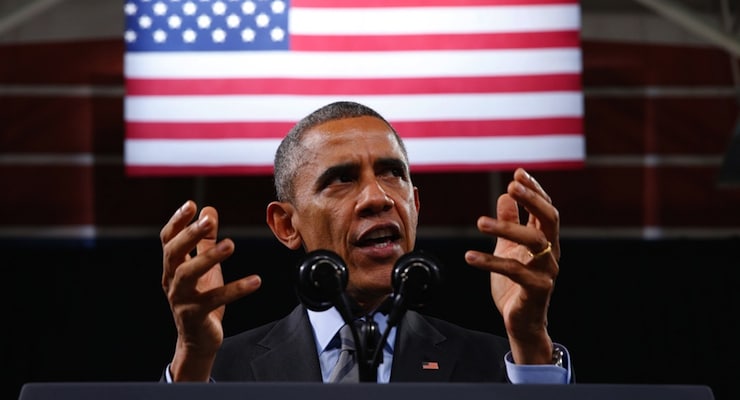

U.S. President Barack Obama speaks about immigration reform during a visit to Del Sol High School in Las Vegas, Nevada November 21, 2014. (Photo: Reuters)
In 2014, President Barack Obama signed 12 executive orders directing various agencies in the departments of State, Justice and Homeland Security to refrain from deporting some 4 million adult immigrants illegally present in the United States if they are the parents of children born here or legally present here and if they hold a job, obtain a high-school diploma or its equivalent, pay taxes and stay out of prison.
Unfortunately for the president, the conditions he established for avoiding deportation had been rejected by Congress.
In response to the executive orders, 26 states and the House of Representatives sued the president and the recipients of the orders, seeking to prevent them from being enforced. The states and the House argued that the president effectively rewrote the immigration laws and changed the standards for the deportation of unlawfully present adult immigrants.
The states also argued that because federal law requires them to offer the same safety net of social services for those illegally present as they do for those lawfully present, the financial burden that the enforcement of those orders would put upon them would be far beyond their budgetary limits. Moreover, they argued, enforcement of the president’s orders would effectively constitute a presidential command to the states to spend their own tax dollars against their wishes, and the president lacks the power to do that.
In reply, the president argued that the literal enforcement of the law creates an impossible conundrum for him. He does not want to deport the parents of American children, as that destroys families and impairs the welfare of children; and he cannot deport children who were born here, as they are American citizens. Hence his novel resolution.
The case was filed in Texas, where a federal district court judge agreed with the states and signed an order that prohibited the feds from enforcing the president’s orders, pending a full trial. The feds appealed.
The U.S. Court of Appeals for the 5th Circuit in New Orleans upheld the injunction against the president. In so doing, it agreed with the states that the financial burden on them that would come from the enforcement of these executive orders would be unconstitutional. It also agreed with the House of Representatives that the president exceeded his authority under the Constitution and effectively rewrote the laws.
This week, the Supreme Court heard the feds’ appeal. Because the seat formerly occupied by the late Justice Antonin Scalia for 30 years is still vacant, the court has just eight justices — for the most part, four conservatives and four liberals. A tie vote in the court, which appears likely in this case, will not set any precedent, but it will retain the injunction against the president. The most recent time this happened was 1952, when the court enjoined President Harry Truman from seizing steel mills during the Korean conflict.
Though the issue here is immigration, the constitutional values underlying the case are more far-reaching. Since the era of Woodrow Wilson — accelerated under Franklin D. Roosevelt, enhanced under Lyndon B. Johnson and brought over the top under George W. Bush — Congress has ceded some of its powers to the president. It has enabled him to borrow unlimited amounts of money and to spend as he sees fit. It has looked the other way when presidents have started wars, arrested Americans without charge or trial and even killed Americans.
Can Congress voluntarily give some of its powers to the president, either by legislation or by impotent acquiescence when the president takes them?
In a word, no.
The purpose of the division of powers — Congress writes the laws, the president enforces the laws and the courts interpret them and decide what they mean — is to preserve personal liberty by preventing the accumulation of too much power in one branch of government.
The 26 states and the House told the Supreme Court this week that the president is enforcing the laws not as Congress wrote them but as he wishes them to have been written, because he actually directed officials of the executive branch to enforce the versions of the laws that he rewrote instead of the laws on the books.
That arguably violates his oath of office, in which he agreed that he would “faithfully” enforce all federal laws. We know from his notes that James Madison, when he drafted the presidential oath, insisted that the word “faithfully” be inserted so as to impress upon presidents their obligation to enforce laws even if they disagree with them.
During oral argument in the court this week, there was a bizarre exchange over terminology that the president used in his orders. In a weird series of questions, Chief Justice John Roberts Jr. asked whether the president’s executive orders could be salvaged constitutionally by excising or changing a few words. This was improper because it treated an executive order as if it were a statute. It is not the job of the court to find ways to salvage executive orders as it is to salvage statutes, because the Constitution has given “all legislative Powers” to Congress and none to the president.
Statutes are presumed to be constitutional. Executive orders that contradict statutes are presumed to be unconstitutional, and the court has no business trying to save them.
All presidents from time to time have exercised discretion upon individuals when it comes to enforcing laws that pose hardships. But none has done so for 4 million people, and none has written substitute laws of his own making. Until now.






